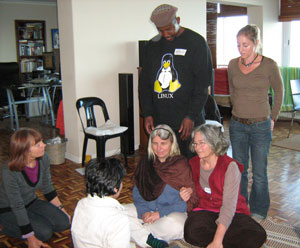
Bert Hellinger has in the past, preferred not to describe family constellations as a therapy even though it is used within a therapeutic process. He has also resisted creating a fixed theory for family constellations. There are however underlying principles that create a holder and a foundation for the work.
Belonging, Balance and Order
These systemic principles of belonging, balance and order guide a Family and Systemic Constellations facilitator as they work with a client within the family constellations modality. An honouring and a respect for others, and an acceptance of ‘what is’ in the present moment, without judgement or assumption, go together with these basic systemic principles described below.
Bonding and belonging
We are bound to our family systems by a deep need to belong; a child will do anything for the love of a parent. The bond to our parents and to our family system begins even before birth; we are born into a family that goes back generations.
Acting in the service of our need to belong, conscience bonds us to the persons and groups necessary of our survival regardless of the conditions they set for our belonging. Hellinger (1998 p. 7)
This belonging and these connections are a source of strength when the energy within the family system is clear and love flows. However, when there is an interruption in the flow of energy, described by Bert Hellinger as an entanglement, the family system and each individual in the system, is potentially weakened. No member of that family will be able to fully access the energy and strength that should flow through the generations as support, into the present generation.
Order
Everyone belongs in a generational family system, dead, still born, aborted, or those who for whatever reason are excluded. And everyone has their own place in the order of the system. Who comes first? The first born child takes first place, then the second born, and so on. It may be that the first born child died soon after birth, and the other children in the family were never told – this child is still the first born, and needs to take the place in the family as the first born child.
The whole family system and each individual in the system will be impacted by those who remain ‘unseen’, or lost or excluded.
Balance
Each family system has a point of equilibrium, a balance point where the system and those who belong feel most comfortable. This balance is built up over time by exchanges of giving and taking: a child being able to ‘take’ from his / her parents; a giving of love and respect; an acknowledgement of the other; or of more material gifts of money or things. The balance is upset when the giving is too much / too little or when the taking is too much / too little.
The restoration of balance and justice to the family system is facilitated by an acknowledgment of the right of previously excluded members to belong; acknowledging those who died young or had a difficult fate; and acknowledging victim / perpetrator trauma. Each individual may then have a place in the system where they may stand and feel more at ease. The family as a group will be able to ‘breathe’ and feel the energy and love within the system flow more easily.
The three simple systemic principles described above open and unfold within a rich complexity of connection, inter-connection and relationship. This complexity offers up new possibilities, news ways of being in life. Through working with a present openess, unknown or hidden events or dynamics are allowed a space to be seen and systemic wisdom uncovered.
When these events are seen and experienced in the present by the client, the impact on the client and the family system is changed – both are lightened and eased.